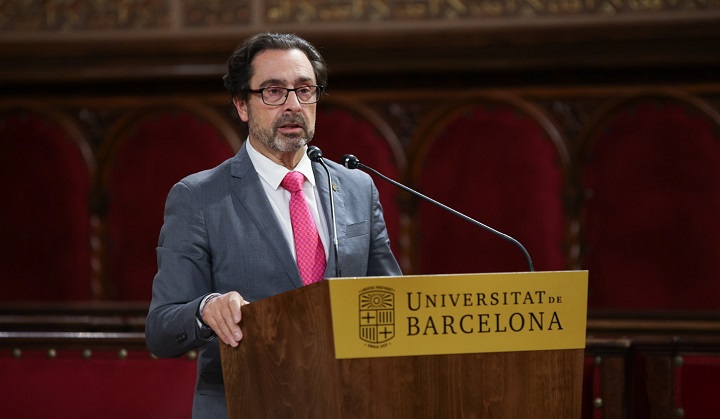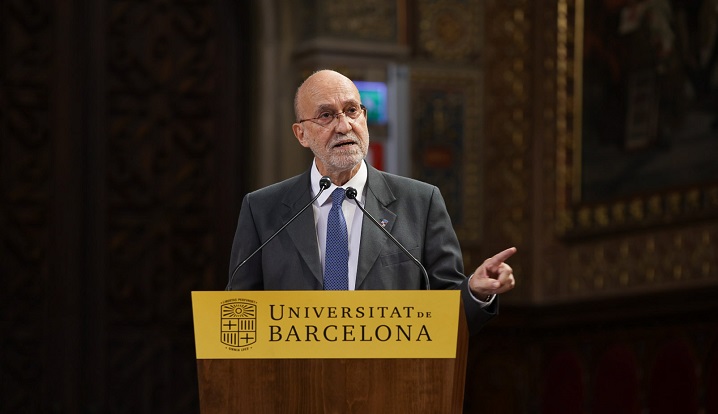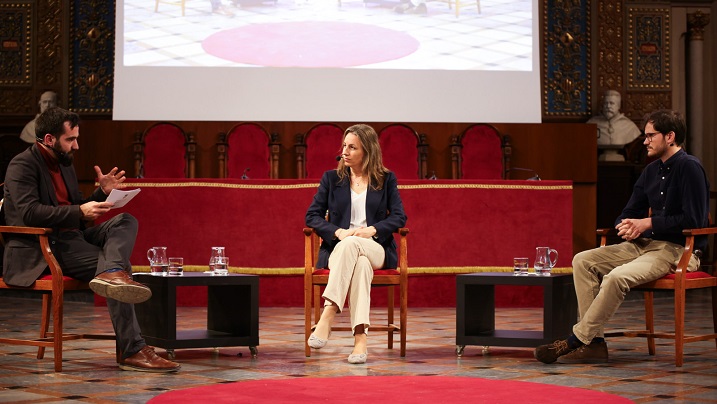The UB calls for specific measures for peace between Israel and Palestine


The text also called for universities and science in general to exert their influence to achieve peace in the region, and recalled the urgency of the situation in the face of the abduction of people and the decision of the UN International Court of Justice to decree that Israel must take whatever measures it can to prevent genocide.
It was also announced that the University of Barcelona will implement several measures, such as a specific line of academic work on the crisis in the Solidarity Observatory; the design and deployment of a solidarity roadmap; the offer of the UB's headquarters and experience to host and contribute to activities that may arise from a negotiation process; the activation of a specific volunteer programme; and the prevention and eradication of any expression of hatred in general and of Islamophobia or anti-Semitism in particular.
There is nothing more academic than peace
In his speech, the Rector said: "Universities, because of our values and track record, are and must continue to be agents of peace, here and everywhere. Cutting-edge science, such as that which we carry out at the University of Barcelona, not only gives us the best tools to resolve conflicts peacefully and in an orderly fashion, but is based on values such as cooperation, the common good and consideration, which are incompatible with the logic of warmongering and pure conflict. The situation of crisis and barbarism that we are witnessing in this case challenges us, we cannot be indifferent: there is nothing more academic than peace".
The event opened with a speech by Professor of Public International Law Xavier Pons entitled "The war in Gaza and the Israeli-Palestinian conflict". Pons stated that "the brutal attacks by Hamas do not constitute any justification for such a disproportionately lethal military response as the one being applied by Israel; likewise, the legitimacy of the Palestinian cause can in no case justify the violence and brutality of the attacks perpetrated by Hamas". The professor criticised "Israel's annexationist policy and practices" and pointed out: "The self-defence that Israel claims to justify its military action must be necessary, immediate and proportional. It must be clearly stated that the deadly and long-lasting Israeli armed reaction that followed does not fit, at all, within any acceptable parameters of proportionality". Xavier Pons concluded: "Without a realistic, open and effective negotiation and political dialogue, with a long view, incorporating the rights of Palestine and the rights of Israel, there will be no peace either for Israel or for Palestine. The only possible and viable final solution, however difficult it may be and however distant it may seem right now, is that of a State of Palestine that can exist alongside the State of Israel, with secure and mutually recognised borders".
This was followed by a dialogue between Elisenda Calvet, professor of Public International Law and expert in human rights and genocide, and Pedro Javier Armengou, freelance correspondent in the region and contributor to the Ara and El Confidencial newspapers. Both pointed out the diversity of historical, religious and other factors involved in the conflict, as well as the role of the international community. Calvet pointed out that "the settlements promoted by Israel are illegal" and denounced the existence of the wall built in 2002, which makes life very difficult for the Palestinian population. Armengou argued that the only solution is for both sides to have a state, but in order to achieve this goal "the great difficulty is that they are societies that live with their backs turned and in fear and hatred".
Multimedia gallery

Xavier Pons, professor of International Public Law, gave the lecture "War in Gaza and the Palestinian-Israeli conflict".

